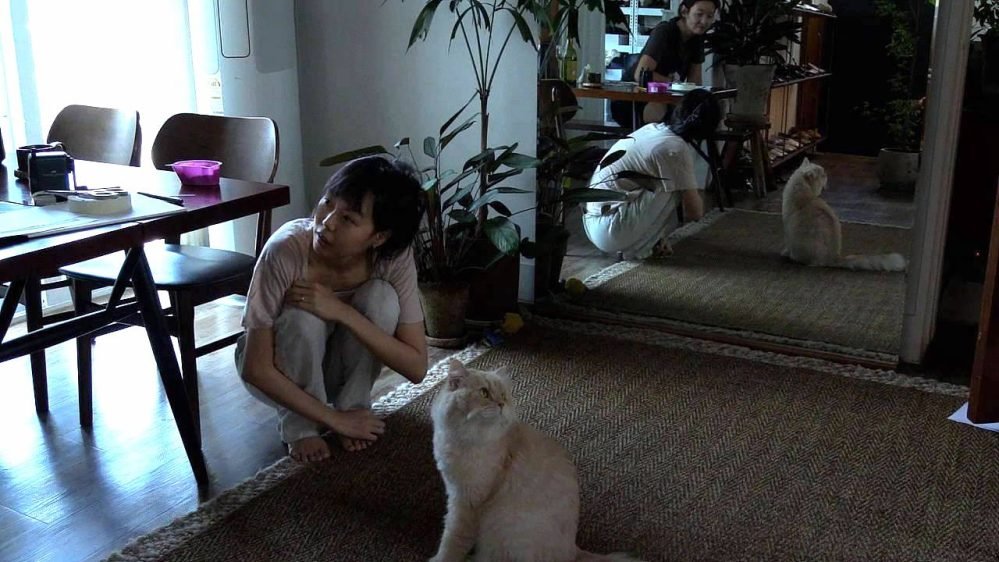Hong Sang-soo’s Sweet Sampler of Connected Lives
[ad_1]
Let’s not be quite so declarative as to insist there are only two types of cinephile, but among the many varieties that exist, there are those who have never managed to connect with Hong Sang-soo‘s ongoing movie project, and those who can watch a minutes-long sequence of Kim Min-hee petting and feeding an already portly cat, and think ecstatically “This is cinema!” The former type will know by now to steer wide clear of “In Our Day,” which will look to them like yet another reinvention of Hong’s eternal mandala-wheel of talky two-shots, unadorned aesthetics and glancing, enigmatic, echoing themes. The latter type will love it for much the same reasons, and may even find themselves surprised by a film that, while not as robust in construction as recent career highlight “Walk Up,” does work in new elements, amongst so much that is welcomingly familiar.
One obvious new development is intertitles, which punctuate the film with terse little descriptions of its two main characters’ states of mind. So before we meet well-known actress Sang-won (Kim Min-Hee), we’re told she’s reliant on her friend Jang-soo (Song Sun-mi) but that she’s lately begun to feel like “she can only really rely on herself.” And introducing the previously hard-drinking, heavy-smoking poet Hong Ui-ju (Ki Joo-bong), a title informs us that his work has found a young following recently, though he himself is questioning his place in the world. Perhaps it’s no accident he shares the director’s surname.
Sang-won, recently returned from a stint abroad, is staying with Jang-soo and her magnificent cat, Us. They are visited by Sang-won’s cousin Ji-soo (Park Miso), an aspiring actress who has come for advice. The cat gets lost, and then is found. The women chit-chat. Sometimes their seemingly offhand conversations will pivot on an unexpectedly raw revelation, such as Ji-soo’s candid account of her loss of virginity, or Jang-soo’s apology to Sang-won for loving her cat more than anybody in her life, even her friend.
Meanwhile Ui-ju, who has been ordered not to drink or smoke by his doctor, is introduced to non-alcoholic beer by Ki-joo (Kim Seung-yun) the fresh-faced young student who is filming his home life for a documentary project. They are joined by a young man, Jae-won (Ha Seong-guk), another aspiring actor, who is also a fan of Ui-ju’s and, inevitably since this is a Hong Sang-soo movie, eventually tempts him back to the way of soju and cigarettes. But as Sang-won says to Us the cat as she feeds him more treats than she ought, “What’s the point of living? You should eat your fill.”
That exhortation to indulge your passing appetites is just one of the connections between the two, ostensibly disparate strands. Sometimes the links are direct — Sang-won strums a hesitant chord on a guitar, and we cut to Ui-ju gifting a guitar he never plays to Ki-Joo. Some are allusive, like the way Sang-won has acquired Ui-ju’s habit of spicing up instant ramen with chilli paste. And sometimes they’re just repeated motifs, like of characters going to sleep in their separate spaces. Sang-won, Ui-ju and the cat are all caught napping, so: her, him and Us.
It’s never made explicit that Sang-won and Ui-ju actually are an “us” — they never share the screen and neither refers to the other directly, with Sang-won coyly maintaining, when asked the name of her mysterious friend, that she’d “better not say.” But it’s certainly the most satisfying read of “In Our Day” to think of them as lovers, maybe past, maybe present, or maybe in the future. This way the film becomes a kind of extended romantic riff on the idea that even when separated, two people can be having consonant, resonant experiences. Even a day spent apart can be “our” day.
Again, the Hong-hater will rightly point out that there are not many directors whose loose, light little movies are given the benefit of the kind of attention that will divine patterns that may or may not be intentional. But the Hong devotee will, also rightly, reply that the director has earned our trust in this respect, and that the joy of his elusive movie-morsels is that the more one puzzles over their uneven surfaces, the more they glow, like polished pebbles. Neither switch-your-brain-off-escapist, nor the kind of arthouse filmmaking that makes heavy demands on your time or willpower, Hong’s cinema remains one of the most reliable sources of this particular pleasure. “Be thankful for the small things that are right in front of us,” says Ui-ju, swigging a drink and bumming a cigarette, in response to his young acolyte’s drunken Big Question about the meaning of life and art and truth. Be thankful for small things, like “In Our Day.”
[ad_2]
Source link

